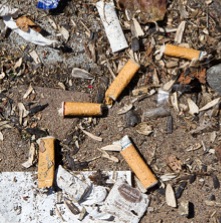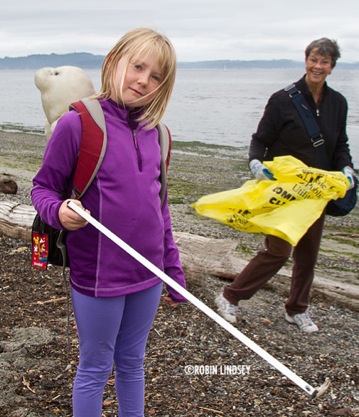No "butts" about it - Alki Beach cleanup a success
Aug/03/13 09:04 PM
Early this morning, 56 adults and children concerned about our marine environment (like 8 year old London from Nevada shown here with her grandmother Jimi), gathered near the Alki Bathhouse intent on cleaning up trash from Alki Beach. Seal Sitters’ Robin Lindsey spoke briefly about the two marine mammals serving as inspiration for the bi-annual event: seal pup
Sandy and the
Arroyos gray whale, both of whom suffered grave consequences from marine debris and trash. Kathryn Davis of Puget Soundkeeper Alliance talked about the importance of keeping the Sound free of trash and pollution - and the many ways we can make a positive impact.
Because yesterday was such a dreary, rainy day with not too many beach-goers, there was not the typical overflow of Friday night garbage strewn all over the sidewalks and beach. However, we assured everyone they would find lots of small, harmful trash - including many cigarette butts. In fact, well over an estimated thousand cigarette butts were picked up in a matter of hours along with plastics and paper.

Why are cigarette filters so harmful? First of all they contain plastic and are often mistaken for food by marine animals and birds. The part of the butt that looks like cotton is actually a cellulose acetate that biodegrades very slowly in the environment. Butts can take up to 5 years to break down in sea water. Since filters are designed to absorb tar and nicotine, they are laced with these toxins as well as lead and cadmium. Within an hour of coming into contact with water, the butts begin to release chemicals. Butts don’t have to be discarded at the beach to end up in our water. They wash down sidewalks and street gutters into storm drains that lead to the rivers, bays and Puget Sound. An estimated 4.5 TRILLION cigarette butts are discarded world-wide each year, leaching toxins into the soil and waterways.
The beach cleanup was a great success - all in all, over 100 hours of volunteer time were donated this morning (we’re still tallying the hours) to help keep all of us and the wildlife we love safe. We thank everyone for their hard work and passion! And a special thanks to SS hotline guru Larry Carpenter for puling everything together to make this happen.
Tags: beach cleanup, Sandy, pollution, marine debris









